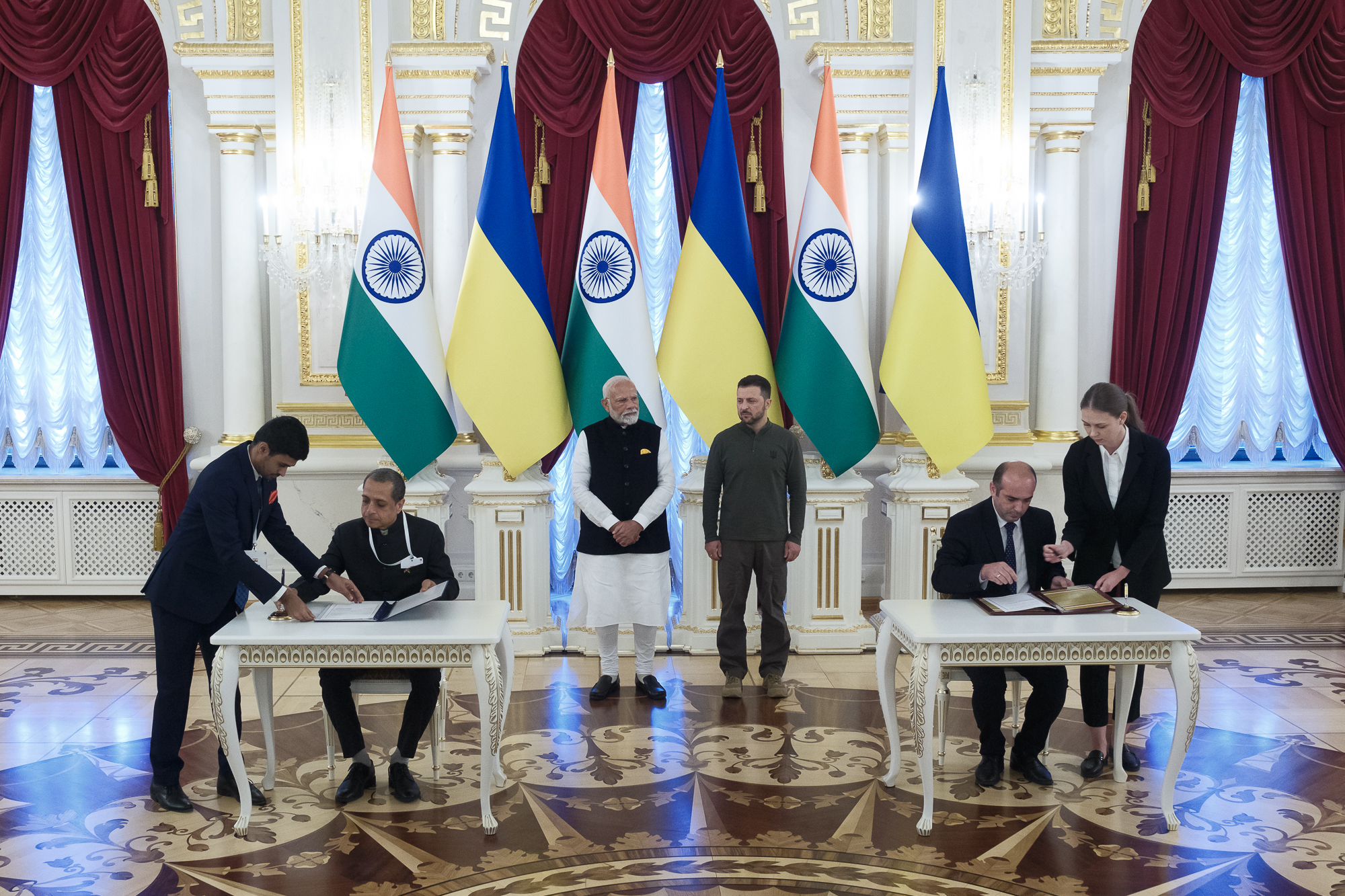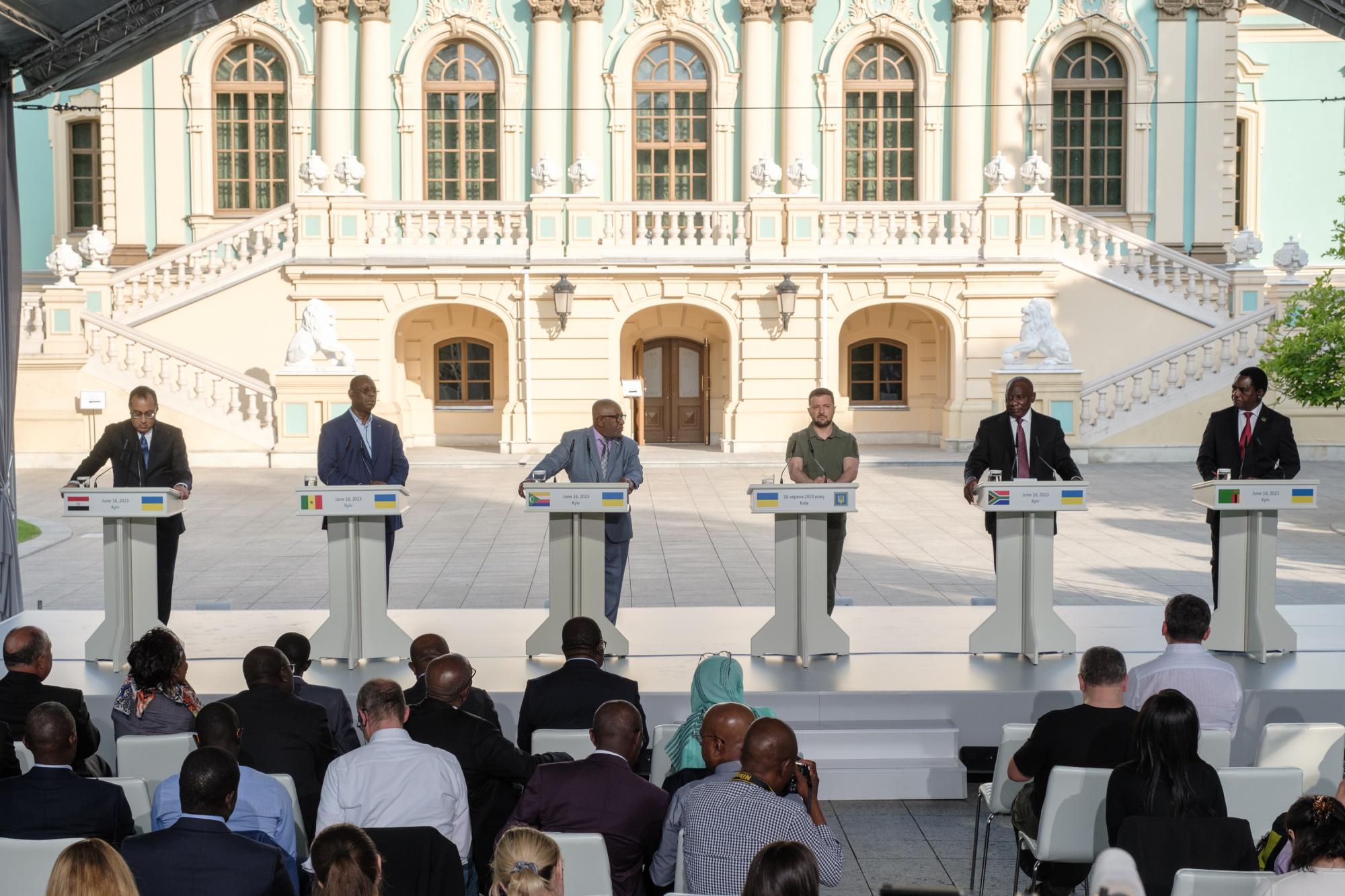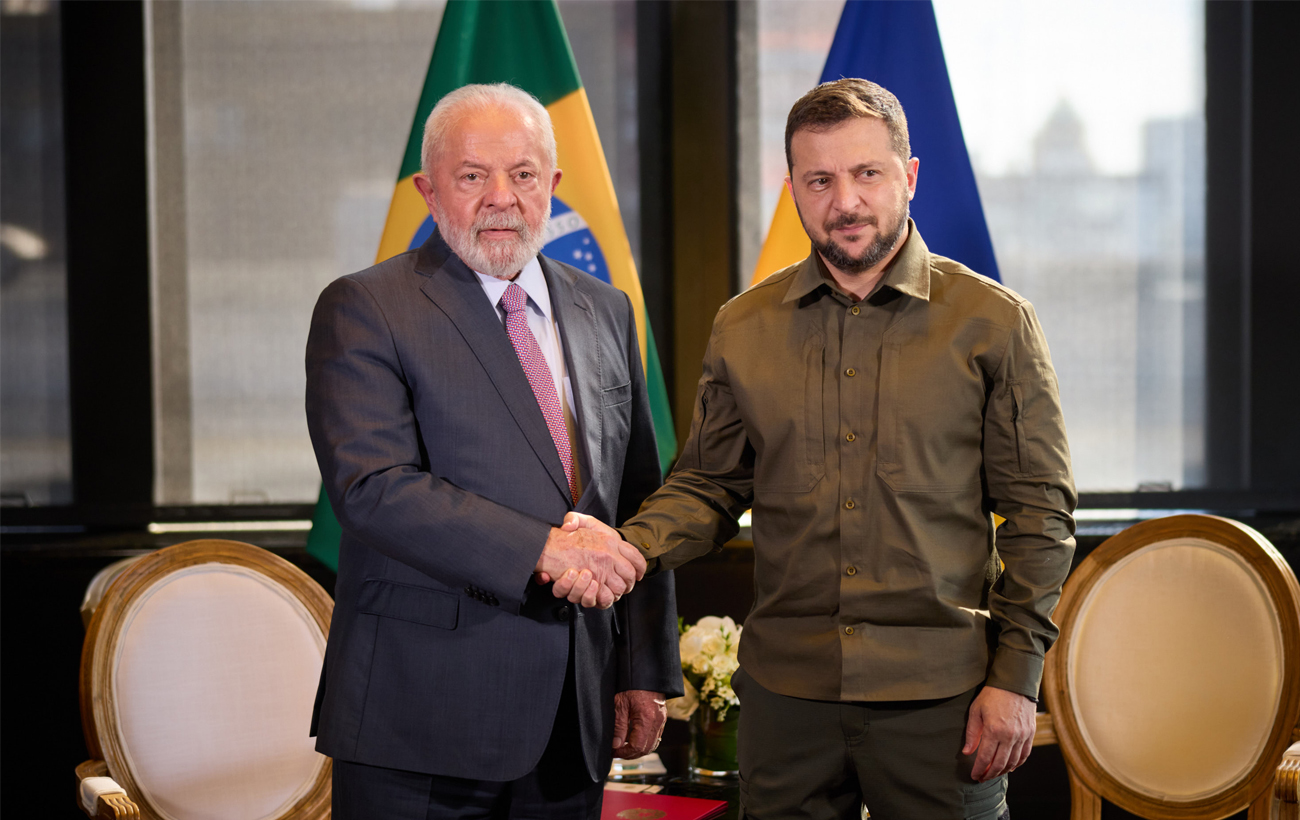Pivot to south: How Ukraine counters Russian impact in India, Brazil, and Africa
 Volodymyr Zelenskyy and Narendra Modi (photo: Vitalii Nosach/RBC-Ukraine)
Volodymyr Zelenskyy and Narendra Modi (photo: Vitalii Nosach/RBC-Ukraine)
How successful are Ukraine's efforts with the countries of Africa, Asia, and Latin America? Are they managing to counter Russian propaganda there, and are Ukraine's messages about the war reaching the Global South audience? To find the answers read the RBC-Ukraine article.
Contents
- India: Pragmatic interests and moral considerations
- Africa: Food and security
- Brazil: Shared challenges and solutions
After the start of Russia's full-scale invasion, Ukraine has noticeably intensified ties with the countries of the so-called Global South - in Africa, Asia, and Latin America. Ukrainian diplomats have repeatedly acknowledged that before Ukraine's foreign policy rarely ventured beyond the Washington-London-Paris-Berlin-Brussels-Warsaw polygon.
There are many reasons for this "pivot to the south." It is not only the need to seek support for diplomatic initiatives such as the "peace formula." Asia is becoming the most economically developed region in the world. Africa and the Middle East remain important markets for Ukrainian agricultural products. At the same time, they are crucial for Europe's overall stability in the context of migration. Latin America is somewhat distant from Ukraine, but the two dozen countries in the region are significant due to their voice in international organizations and their natural resources.
As part of the conference "Crimea Global 2024. Understanding Ukraine through the South," which was recently held in Kyiv, RBC-Ukraine spoke with experts from the Global South about how effectively Ukraine communicates with their countries, whether it is managing to win them over, and how it counters the traditionally strong Russian influence there.
India: Pragmatic interests and moral considerations
India is one of the largest economies in the world, a nuclear power with global ambitions, and a role model for many other countries in Asia and Africa. Due to longstanding ties with Russia dating back to Soviet times, India has become dependent on Russian weaponry. In addition, with the start of Russia's full-scale invasion of Ukraine, India has become one of the largest purchasers of Russian oil.
At the same time, India does not openly support Russia but merely seeks to take advantage of Russia's weakening position, Swasti Rao, Associate fellow at the Center for Europe and Eurasia at the Manohar Parrikar Institute for Defense Studies and Analyses, told RBC-Ukraine. A striking example of this approach is India's purchase of discounted Russian oil.
"One should know that India has never bought Russian oil before the war in Ukraine began. We got our oil from the Gulf countries. When the war started and when there were sanctions put on Russia, Russia wanted to reach out to other economies, and it gave us a lot of discounts," the expert emphasized.
According to Swasti Rao, the country would abandon Russian oil if another supplier offered India lower prices.
As for Russian weaponry, India has not signed any new contracts with Russia since the start of the full-scale invasion. Here, too, pragmatic reasons prevail. On the one hand, Russia is redirecting all its weapons to the frontlines against Ukraine, causing previously signed contracts to collapse. According to a March report by the Stockholm International Peace Research Institute, India imported 76% of its weapons from Russia in 2009. By 2023, Russia's share had dropped to just 36%.
On the other hand, there are technological concerns. Russian weapons often contain foreign-made components, but their supply from Europe is gradually being restricted, with Chinese components taking their place. This raises concerns in India about potential vulnerabilities in Chinese parts, which pose security risks given the strained relations between New Delhi and Beijing.

The signing of bilateral agreements between Ukraine and India (photo: Vitalii Nosach/RBC-Ukraine)
In this situation, Ukraine, along with other countries, is leveraging Russia's growing isolation. For instance, India is seeking alternatives to Russian weaponry, and there is interest in Ukrainian drone technologies, where Ukraine is undoubtedly one of the global leaders. Similarly, many Indian naval vessels are equipped with engines manufactured in Ukraine. These factors objectively bring Ukraine and India closer.
India's public stance on Russian aggression remains neutral, but for Ukraine, a symbolic milestone was the visit of Indian Prime Minister Narendra Modi to Kyiv in August this year. Following the visit, India began playing a more active mediatory role. Modi's position is significant in this regard. On July 8, while he was in Moscow, Russia attacked the Okhmatdyt Children's Hospital in Kyiv. As reported by RBC-Ukraine, Modi perceived this as a personal insult.
Nevertheless, India still lacks a clear understanding of the situation in Central and Eastern Europe. Thus, the battle between Ukrainian and Russian narratives continues in this domain. Compared to Russia, Ukraine has far fewer resources. However, according to Rao, this gap can be bridged through cohesive efforts at various levels.
"Diplomatic level engagement must continue, of course. But more than that, I think also the civil society, the scholars, the conferences, more joint publications, more think-tank level association, all of that will work," the expert highlighted.
According to her, pro-Russian sentiments persist primarily among the older generation of Indian elites. The younger generation, however, has a more pragmatic outlook.
"I would say Ukraine should pursue a strategy of what is called Russia plus one, which means that, okay, you have your ties with Russia, you can take care of that. But you should also be open for developing ties with Ukraine and the larger world and maybe stabilize the East European security theater being a country that is committed to peace," Rao concluded.
Africa: Food and security
More than 50 African countries have vastly different historical trajectories. Some gained independence peacefully, while others fought liberation wars against European colonial powers. Some managed to build functioning economies and stable political systems, while others descended into endless internal conflicts.
In Africa, Ukraine was primarily known for food supplies and educating African students, mostly among experts. Among the general public, Ukraine was known merely as a country that exists - much like other nations in Central and Eastern Europe, Brian Oruta, Senior digital reporter for Kenya’s Star newspaper, told RBC-Ukraine.
However, after Russia's full-scale invasion, African populations had to be informed about why food prices suddenly spiked and how this was linked to Russia's blockade of Ukrainian ports. This pragmatic perspective still largely shapes Africa's perception of Ukraine.
African countries' pragmatic approach was evident in June 2023, when presidents from South Africa, Zambia, Senegal, the Comoros, Uganda, Egypt, and the Republic of Congo visited Ukraine jointly. The African leaders proposed their peace plan, which included freezing hostilities - a measure they believed would help resolve issues like disruptions in Ukrainian food supplies. Ukraine, unsurprisingly, rejected this approach.

Volodymyr Zelenskyy and leaders of African countries during a visit to Kyiv (photo: Vitalii Nosach/RBC-Ukraine)
In November 2022, President Volodymyr Zelenskyy launched the Grain from Ukraine initiative. It involves direct purchases of Ukrainian grain and its delivery to countries threatened by famine, funded by developed nations. As part of this initiative, over 280,000 tons of Ukrainian agricultural products have already been delivered to 12 countries across Africa and Asia.
Regarding political assessments of Russian aggression, the situation varies widely across African nations. In some cases, Russia's propaganda has succeeded in promoting narratives about a "hostile NATO" and Moscow's alleged "protection of its interests in Ukraine." In Africa, the Kremlin invests in media, humanitarian projects, and political elites, leveraging Soviet-era sentiments.
"They (the Russians - ed.) try to work with influencers, public figures, and celebrities to promote their agenda. They also offer free Russian language classes. For instance, they post announcements on social media, and you can join a fully funded course," Oruta explained.
He also noted that education is especially significant in this context. For many Africans, a degree is one of the few paths to success. Russia capitalizes on this by offering numerous scholarships and grants.
"Russia is winning this war. That is the biggest propaganda we have. You can't convince anyone. I have friends who tell me Ukraine should just consider it. Ukraine should give Russia what it wants to end this war. Otherwise, Ukraine is getting destroyed," Oruta said.
In addition, former Wagner mercenaries remain a powerful tool of Russian influence. They have entrenched themselves in several West African countries, assisting local regimes in maintaining power.
Ukraine has far fewer resources to counter Russian influence in Africa. Yet, there has been positive progress. In December 2022, Ukraine adopted its first communication strategy for African nations. Since 2022, seven new Ukrainian embassies have been established on the continent, bringing the total to 20. However, as RBC-Ukraine reports, staffing these embassies remains challenging, as Africa is not considered the "most prestigious" diplomatic posting.
The stance of many African countries is heavily influenced by their key economic or political partners - China, the United States, the European Union, or even the United Kingdom.
This dynamic was evident during preparations for the Global Peace Summit on June 15-16, 2024. China refused to participate, prompting several African and Asian countries to also withdraw. President Zelenskyy even accused China of attempting to sabotage the summit.
On the other hand, part of the African delegation was secured through US and EU mediation. Moving forward, the influence of third parties on Africa's position regarding Ukraine will continue to play a significant role.
Brazil: Shared challenges and solutions
Among the Global South regions, Latin America appears to be the least engaged with events in Ukraine. The primary challenge in Ukraine's relations with the region lies in its geographical and political distance. Latin America has a distinct agenda that is far removed from Ukrainian or European concerns. Nevertheless, Ukraine has secured support from two regional leaders, Chile and Argentina.
However, the official stance of the continent's most powerful nation, Brazil, remains ambiguous. Brazilian President Luiz Inacio Lula da Silva condemned Russian aggression. At the same time, Brazil endorsed the Chinese peace plan, which effectively called for Ukraine's capitulation. The plan includes six points, advocating an immediate ceasefire, "de-escalation," and peace negotiations between Kyiv and Moscow, without requiring Russia to withdraw from occupied Ukrainian territories.
"We can at the same time find the civil groups that are very pro-Ukrainian and very willing to show solidarity to the Ukrainian people, and they, of course, support what Ukraine is doing in the war, etc. But at the same time, on the government level you have a group that is sometimes described as pro-Russian," said Fernanda Magnotta, Global Fellow at the Wilson Center and Analyst for CNN Brazil, in comments to RBC-Ukraine.
According to Magnotta, Brazil's political elites do not necessarily back Russia in its war against Ukraine. Instead, their position stems from Brazil's strong strategic ties with Russia, particularly through BRICS (forum for cooperation among a group of leading emerging economies, including Brazil, China, Egypt, Ethiopia, India, Iran, Russia, South Africa, and the United Arab Emirates - ed.).

Volodymyr Zelenskyy and Luiz Inacio Lula da Silva (photo: x.com/ZelenskyyUa/)
At the same time, the country's current leadership, represented by President Lula da Silva, supports the idea of autonomy in foreign policy. This means not relying on any particular country or partner. This is also combined with anti-Western sentiments traditionally prevalent in many Latin American countries.
"Many Brazilians are convinced, including in the government, that Russia is raising a voice against the US, against other countries that in the past were a threat for Latin Americans as well," Magnotta noted.
This perspective partly explains why Ukraine's messages about Russia attempting to colonize Ukraine fail to resonate with the Global South.
"The current rhetoric focused on colonialism does not seem to be achieving the desired results. When Ukraine rightfully denounces Russian colonialism while simultaneously expressing its legitimate desire to join NATO and the European Union, institutions that are often seen by many in the Global South as responsible for causing some of the world's disorders, it sends a message that comes sometimes as contradictory," remarked Uria Fancelli, International political analyst and CNN Portugal commentator.
According to Magnotta, in Brazil, Russia is not perceived as a threat, although it has allied relations with a country that is perceived as a source of instability on the continent.
"Venezuela is a very sensitive subject in Brazil. If you want to mobilize people in Brazil, the right, the left, you just talk about Venezuela. And because now Venezuela has the most important partners, Russia and China, if you want to address to the Brazilian audience about fear, don't say like Russia is coming to catch you. But if you defend the idea that maybe the Russian presence can bring to the region some kind of threat, it could be working," Magnotta explained.
This position was manifested during the G20 summit, which was held in Rio de Janeiro on November 18-19. Brazil generally tried to "put the Ukrainian agenda out of the brackets." At the summit, European countries insisted on harsh assessments of Russian aggression, but Brazil and many other countries of the Global South offered softer definitions. In the end, the final declaration called for a "comprehensive, just and lasting peace" in Ukraine. At the same time, as at the previous meeting, the leaders of the 20 largest countries of the world did not directly condemn the Russian invasion.
According to Fancelli, one way to shift Brazil's position is to focus on future shared challenges rather than past conflicts.
"If you need an approach that works better, maybe you should think about finding common ground. What can make the future better, rather than looking at the past? Brazil, for example, believes that the UN Security Council should be reformed and include Latin American countries. So why not work together, maybe use that as a common basis," the expert said.
***
Despite regional differences, Ukraine's challenges with the Global South have similarities. Russia does not always have a negative image in these regions. Instead, the Soviet legacy often works in its favor. During the Cold War, the USSR actively supported the Global South, often at the expense of Western countries. Many current political elites were educated in the Soviet Union. Today, Russia leverages this legacy, investing in propaganda and promoting its narrative of opposing "US dominance." Corruption among local elites, opinion leaders, and media further complicates the situation.
For Ukrainian diplomats, this underscores the complexity of their task. With fewer resources to counter Russian influence, Ukraine's "speak the truth" strategy - emphasizing the real reasons behind Russian aggression and focusing on shared pragmatic interests - has begun to yield results. Coordinating efforts with European and American partners has been particularly effective.
Ultimately, Ukraine and the Global South share common issues: climate change, global economic inequality, and ensuring international security, where no country can attack another without consequences. While awareness of these shared concerns is growing, the inertia of positive attitudes toward Russia remains strong.
Sources: comments from Swasti Rao, Associate fellow at the Center for Europe and Eurasia at the Manohar Parrikar Institute for Defence Studies and Analyses; Brian Oruta, Senior digital reporter for Kenya’s Star newspaper; Fernanda Magnotta, Global Fellow at the Wilson Center and Analyst for CNN Brazil; and Uria Fancelli, International political analyst and CNN Portugal commentator.

